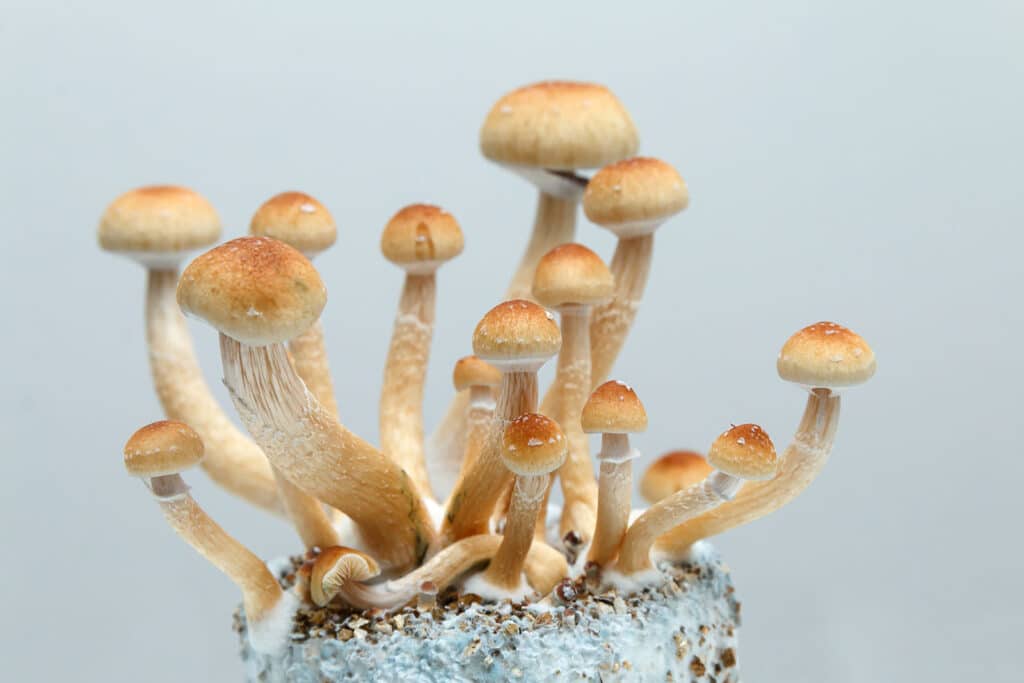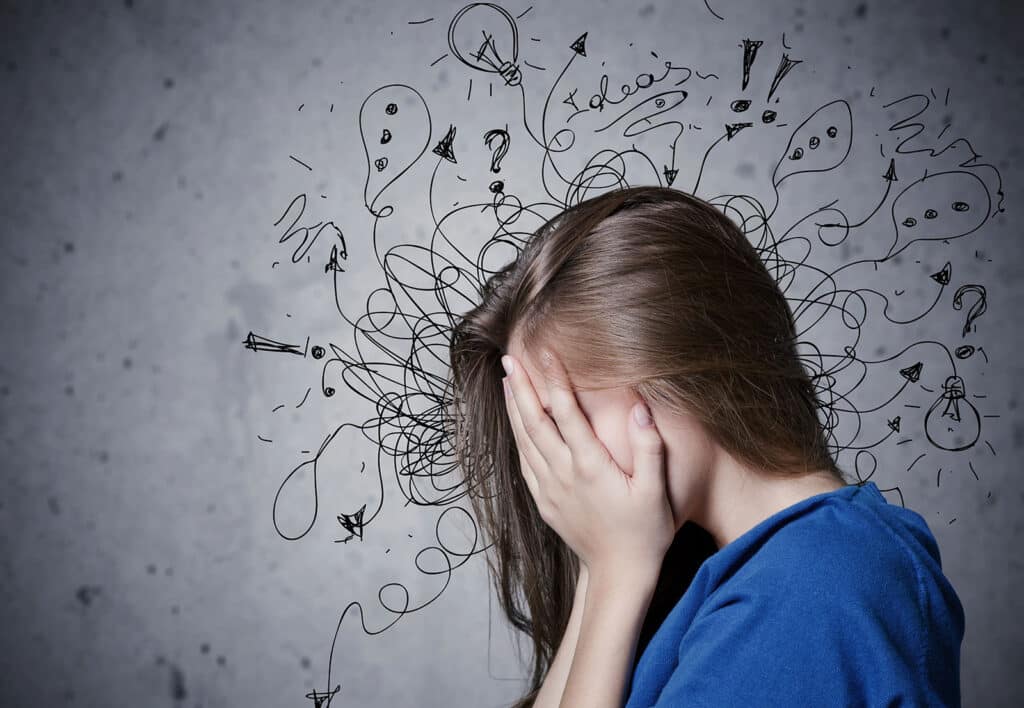If you’ve been reading news headlines recently, you may have noticed some surprising research on using mushrooms for anxiety and stress. While the headlines are exciting, there are still real concerns about how these drugs can impact human health. Additionally, some types of mushrooms have legal prohibitions, which means most people won’t have access to these types of drugs.

Table of Contents
Understanding Stress and Anxiety
Anxiety is a part of your body’s normal reaction to stress. Unfortunately, it can occur even when there isn’t a threat present. When anxiety doesn’t go away, it can end up impacting your overall health. It can harm your digestive system, cardiovascular system, sleep quality, and other aspects of your physical health.
On its own, stress can be a good thing. Your body’s stress response was designed to prepare you to fight or flee a tiger. However, modern life is completely different from hunter-gatherer societies. The same mechanisms that once protected your body may now be causing it harm.
At its core, stress is the mental or physical reaction you have to an external cause. You may feel stressed when your teacher gives a pop quiz or when a boss assigns an excessively large workload.
In comparison, anxiety is the way your body reacts to stress. It can occur even if there is no stressor present.
Often, people manage stress and anxiety through meditation, exercise, and breathing exercises. There are also different medications and therapies that may be prescribed if you are diagnosed with anxiety. For example, cognitive behavioral therapy (CBT) is a popular treatment for anxiety because it helps manage the way your feelings trigger your thoughts and actions.
The Rise of Natural Remedies
An estimated 31.1% of American adults will suffer from an anxiety disorder at some point in their lives. In an effort to alleviate these symptoms, some people have turned to natural remedies.
Over the last few years, experts have noticed a trend toward treating anxiety with natural remedies and a growing reluctance to treat this disorder with medication. For example, some people use kava root because it has neuroactive compounds that encourage euphoria and sedation. Ashwagandha is another plant used to alleviate stress and reduce cortisol.
Mushrooms are another type of medicinal plant that is receiving increasing attention for its ability to alleviate anxiety and stress. While more studies are needed to determine side effects and dosage, there are already early indications that mushrooms can effectively treat anxiety.

Types of Mushrooms Used for Stress and Anxiety
There are many kinds of mushrooms in the world. Each type can achieve different effects on the human body. When it comes to anxiety and stress, the most effective kinds of mushrooms tend to be adaptogenic and psychedelic mushrooms.
Adaptogenic Mushrooms
Adaptogenic mushrooms, unlike hallucinogenic or “magic mushrooms,” won’t alter your perception or cause hallucinations. Instead, they possess powerful adaptogenic properties that help reduce the harm chronic stress causes to your body. By balancing stress hormones like cortisol, these mushrooms can improve your body’s physical, chemical, and biological resilience to stress, supporting overall wellness and mental health.
These medicinal mushrooms exert their effects through the hypothalamic-pituitary-adrenal (HPA) axis, your body’s primary stress response system. They also help combat oxidative stress, which is often linked to anxiety, depressive disorders, and mood regulation. Several well-known adaptogens offer a variety of health benefits that may support brain function and neurotransmitter balance, such as dopamine, and promote overall wellness.
Here are a few key adaptogenic mushrooms often used to manage stress, anxiety, and improve mental health:
- Reishi: Also known as the “mushroom of immortality,” reishi is valued for its calming effects, immune system support, and antioxidant-rich nature. Its adaptogenic properties help regulate stress and anxiety, making it a popular choice for promoting relaxation and reducing oxidative stress.
- Lion’s Mane: This mushroom is renowned for supporting a healthier nervous system and improving cognitive function. It encourages nerve growth factor production, which is essential for brain health, potentially benefiting those with depressive disorders or cognitive decline.
- Cordyceps: Known for boosting energy levels, cordyceps also increases your resilience to stress. It can improve physical endurance and help your body adapt better to stress, making it an excellent option for supporting both mental and physical health.
- Chaga: This mushroom is a powerhouse of antioxidants, known for its anti-inflammatory and stress-reducing benefits. It helps to lower oxidative stress, supporting overall wellness and mental clarity.
Incorporating these mushrooms into your routine may offer numerous potential benefits, including enhanced mood regulation, stress management, and improved overall brain function.
Psilocybin Mushrooms
Recently, there’s been additional research on the ability of psilocybin mushrooms to alleviate anxiety and depression. In many cultures, these mushrooms were used for spiritual and divinatory ceremonies. The South American Aztec Indians even referred to them as god’s flesh.
Over the course of the last 15 to 20 years, multiple psilocybin studies have been approved by the Food and Drug Administration (FDA). Some of these studies have indicated that psilocybin may potentially treat anxiety, addictions, and depression. However, it is important to note that psilocybin is illegal on a federal level in the United States.
Scientific Evidence and Research
There have been a few important research studies that have looked at the efficacy of different mushrooms for treating anxiety and stress.
Reishi and Anxiety
In one study of reishi in rodents, scientists demonstrated that this treatment can decrease stress-related brain inflammation. In the study, rats were exposed to low oxygen. The rats that received reishi were protected from nerve damage and memory issues.
In humans, researchers have conducted a small study of male athletes that involved reishi and cordyceps. After taking these mushrooms, the athletes were less likely to have stress-related damage from overtraining.
Finally, a 2012 study discovered that people who had breast cancer were less likely to experience anxiety, depression, or fatigue four weeks after they took reishi. Additionally, the participants enjoyed a better quality of life than the control group.
Lion’s Mane and Cognitive Health
Lion’s mane has shown promise in clinical trials for promoting cognitive health. Research indicates that it can boost mental clarity and decrease stress levels.
In a mice study, it was found to protect against Alzheimer’s disease and memory loss. Lion’s mane mushrooms contain two compounds, hericenones and erinacines, which can stimulate brain cells to grow.
In animal research, lion’s mane was found to have anti-inflammatory effects. It could regenerate brain cells and enhance the functioning of the hippocampus. The hippocampus is known as the part of the brain that is in charge of emotional responses and processing memories.
Psilocybin Research
Even though psilocybin isn’t legal, some research has looked at its efficacy in treating anxiety and depression. Scientists have found that it can alleviate anxiety, depression, obsessive-compulsive disorder, and end-of-life psychological distress.
In one 2016 study, researchers gave cancer patients a single dose of psilocybin. The participants saw an improvement in their mental health symptoms, feelings of existential depression, quality of life, and spiritual well-being. Six months later, researchers found that 80% of participants were still experiencing these benefits. After three years, the results remained the same.
Meanwhile, a 2020 research review reported that three different studies found psilocybin was effective at treating depression and anxiety in patients who had life-threatening illnesses. In addition to reducing anxiety, psilocybin helped alleviate fears of death and enhance overall well-being.
While more is still being learned about how psilocybin works, scientists currently believe that it impacts the production of serotonin in the mind. Nicknamed the “feel good” hormone, serotonin is necessary for states of happiness and satisfaction. Often, people have low levels of serotonin when they are suffering from anxiety or depression.
Selective serotonin reuptake inhibitors (SSRIs) can boost serotonin in the brain, but it can take weeks to have an effect. In some cases, it doesn’t lead to any improvement at all.
When psilocybin is used, scientists can see changes in neuron connectivity in just half an hour. Immediately, there is a change in how different parts of the mind communicate.
Safety and Considerations
While mushrooms show promise for a variety of health benefits, it’s important to exercise caution when using them, especially in the form of mushroom supplements or extracts. These products, including mushroom powder or teas, are not cleared by the FDA and may interact with other drugs. Furthermore, certain individuals may experience dangerous allergic reactions to mushrooms or their compounds, such as polysaccharides found in varieties like Ganoderma lucidum (reishi). Always consult a healthcare professional before incorporating any type of mushroom supplement, extract, or pharmacological treatment into your regimen.
- Psilocybin Mushrooms: As a psychedelic drug, psilocybin may cause confusion, hallucinations, high blood pressure, paranoia, headaches, fear, and nausea. It is often used for its effects on serotonin receptors, but it can also lead to negative experiences, such as bad trips or worsening anxiety and depression in certain individuals. It is important to understand that psilocybin-containing mushrooms are not a placebo and can have potent psychological effects.
- Cordyceps Mushrooms: Cordyceps mushrooms are generally considered safe when taken in appropriate doses for less than a year. These mushrooms are often found in supplements and powders, and while they are beneficial for energy and stress resilience, they can cause mild gastrointestinal issues like stomach discomfort, diarrhea, or constipation. Cordyceps is also widely used in Traditional Chinese Medicine.
- Reishi Mushrooms: Ganoderma lucidum (reishi) extract is likely safe when used for less than a year. However, powdered reishi should be limited to 16 weeks of use. Reishi mushrooms are prized for their adaptogenic properties, but some individuals may experience side effects such as rashes, itching, dry mouth, dizziness, or nausea, particularly when consumed in larger amounts.
- Lion’s Mane Mushrooms: Hericium erinaceus (lion’s mane) is likely safe when taken for less than 16 weeks. Known for its potential benefits in cognitive function and nerve growth, this mushroom can sometimes cause mild side effects like stomach discomfort when taken orally.
Before using any mushroom product—whether in the form of extracts, powders, or teas—it’s important to consult a healthcare professional, particularly if you’re already taking medication. Traditional and medicinal mushrooms, while rich in pharmacological potential, should be approached with care to avoid adverse reactions.
Learn More About Your Options
When you are becoming sober, it’s normal to experience anxiety and depression as your serotonin levels start to adjust. For many people, rehab can be a stressful experience. However, there are many alternative ways to manage symptoms of anxiety and depression.
If you’re interested in taking the next step in your sobriety, we can help. At Garden State Treatment Center, we offer a flexible rehab program that can be designed to match your unique needs.
Published on: 2024-08-09
Updated on: 2025-02-19



